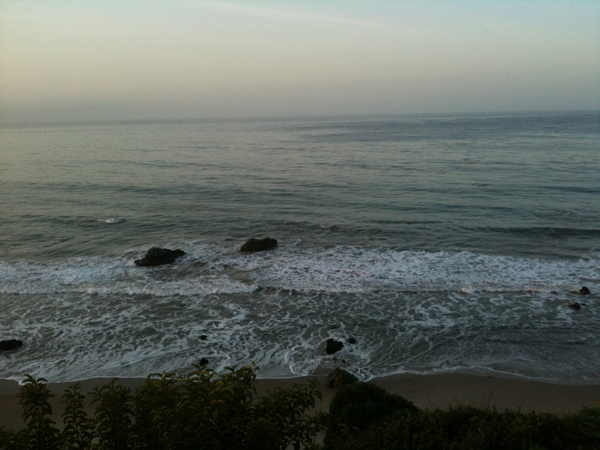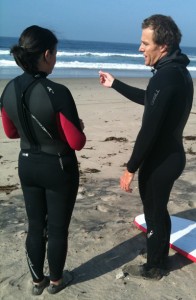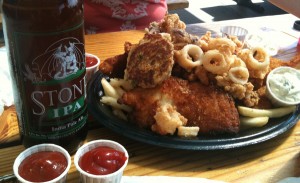
I stood on a cliff overlooking the Pacific Ocean. Inside, the blow-dried, TV talking-heads on L.A.’s news leader blared breathless accounts of a pending tsunami, destined to swamp the Southland at any moment. To their unconcealed disappointment the Breaking News Event didn’t happen: Outside, it wasn’t different than any other sunny Southern California morning. Waves crashed on the rocks. Seagulls squawked overhead. Sunlight warmed the horizon. Tomorrow I would be swimming in that ocean, in the aftermath of a tsunami thousands of miles away.
In February, I agreed to be the swimmer for my friend Kristi’s triathlon team. 1500 meters in Tempe Town Lake. I have never claimed to be a fast swimmer – but I am a strong swimmer. I can cross great distances without tiring, probably because I’m so slow. Wanting to be a good partner to Kristi’s significant fitness, I signed up for an ocean swim lesson, taught by Brett Sanson of Zuma Surf and Swim Training. He has more than 20 years experience as a swim instructor and lifeguard on Zuma Beach in Malibu.
Brett is that good: He taught me how to swim in the Pacific Ocean.

We started at 9 that morning with frothy seas and 51-degree skies. We would first address a basic understanding of ocean conditions:
“You picked a helluva day to learn how to swim in the ocean,” Brett said. Though we would not be swimming in the tsunami per se, the Pacific was an angry mess of rip currents and breaking waves. Not quite angry enough to force the closure of the beach as it had the day before, but enough to make a challenging workout for me.
We discussed entering and leaving the water: “Never turn your back on the ocean.” He taught me to dive into the waves – arms first to protect my head and neck against anything that might be lurking beneath (if only I’d been so careful before the triathlon sign-up). We waded waist-deep, as Brett figured I could get in plenty of swimming parallel to the shore without having to go beyond the surf break.
I was OK with that.
“Are you gonna wear goggles?” he asked, motioning to the rubber-clad eyewear strapped to my head.
“Well, yeah, I always do, why?”
“Well, you really don’t need them – you can’t see anything.”
I thought about this for a moment and looked down into the foamy water – nope, no black line or lane ropes.
“I wear goggles all the time, so I think I’d just as soon wear them now.”
“OK, let’s go then.”
I dove in. I opened my eyes and heard a tornado, the brown sand spinning in front of me, the cold water crashing all around. It was like my very first swim lesson – bereft of my floaties and flung into the deep end! I turned my head to breathe in the bracing, salty air. Mind over matter: I am a fierce and strong and efficient and powerful swimmer! I tried out for the Navy SEALS. I can do this! Stroke, stroke, stroke and breathe … stroke, stroke, stroke and breathe… stroke, stroke, stroke and a wave rolled into me, washing brine down my throat. Hands and feet cartwheeling through the surf, ass over tea-kettle, tea-kettle smashed on the rocks, ass washed out to sea.
Coughing and gagging, I opened my eyes. Brett was right there. I hadn’t even gone 20 feet.
“You alright?”
I hacked up seawater in response. “Let’s walk back to shore and take a breather – don’t turn your back on the ocean.”
Like an ancient mariner in reverse, I staggered backward to the beach. My hands shaking, my breath rattling through my lungs, we discussed ocean navigation. Apparently I have a pretty efficient swim-stroke. Because I breathe out of both sides of my head, I naturally swim pretty straight. Swim coaches call this bilateral breathing… they say it’s a handy skill. If I hadn’t been so good at it, I probably wouldn’t have gotten a mouth-full of wave. Instead of just relying on my innate ability to swim straight, however, Brett wanted me to navigate by popping my head up slightly every 3-4 breaths to see where I was heading – and if I managed to see a wave coming on any of my breaths, I’d duck my shoulder down and dolphin through it at an angle.
You can see where this is going.
“Come back over here, Stacy,” he’d say. I’d pop my head up and realize he was only 5 feet away, but I was bearing seaward toward the Aleutians, at a rate of about 4 feet per hour. The current was so bad, I was swimming on a treadmill set to Uphill-Level 10 – and just as swiftly wearing myself out. A surfer I’d feared moments before was already half-way down the beach, and I was standing still with the sand spinning out from under my toes. Just one more time. Just one more time. But let’s wait till the next wave. Well, after this one. The next one… And starting… NOW.
I kept swimming, but I wasn’t going anywhere – and the waves just kept coming, over and over and over again. It was not a tsunami. It wasn’t even low tide. It was just the ocean – oblivious and unchanging and unconcerned, tugged to and fro by the moon in her incessant orbit.
“I think we might be done for the day – do you feel like you’ve gotten a good work out?” Brett asked.
I sputtered up seawater.
“You did great today. If you can swim in this ocean, a lake will be a piece of cake, Stacy,” Brett said. “You’ll be fine in your race.”
If only my poor father had heard these words. I spoke with my Daddy about a week after my ocean swim, and he was in a lather.
“I know you’re almost 40 years old and I can’t tell you what to do – I’ve never been able to tell you what to do. But please, please, don’t ever do that again. I can’t believe your mother let you go out there.”
“Dad, I had a lifeguard with me. We were in waist-deep water, and the tsunami was the day before -”
“It doesn’t matter. I was terrified. Please don’t do that again. Please. I had visions of you being swept out to sea.”
Actually he was probably having visions of me being about 4 years old in my Bert and Ernie bathing suit, him carrying me on his hip out into the Gulf of Mexico at Port Aransas, Texas. It is one of my first hazy memories – the sun sparking off the water, the waves rolling into us, the briny taste of ocean in my mouth.
“OK, Daddy. You can tell them to turn it off. Turn it off now, Daddy.”
Little did he know: On that, my first day in the ocean, Daddy was not baptizing a little mermaid or even a little dolphin… more like a little manatee – a benign beast lumbering through the estuaries, drifting toward but never crossing that boundary of freshwater and open sea. I have always loved to swim, but just like that baptism by saltwater, I’ve always been a little afraid of the ocean. My swim lesson with Brett only served to reinforce that fear, but in a healthy way. It is a mighty and staggering sea that gives no thought to our world domination. I felt small and insignificant and water-logged and tired.
The thing I like about swimming is that it has always been a refreshment for me. Unlike my friends growing up who were tethered to the swim team, peeling off pre-dawn laps under a drill-sergeant coach, I swam for pure fun and heat relief, and I did it on my own timetable. My experiences with the water were not governed by a lap clock or where I would be on the relay (an anchor, not the anchor). Not long after my first memory of my Dad in the ocean, I remember Mom taking me and my sister to swimming lessons. She watched by the pool with a magazine in her hands and a carton of malted-milk balls in her purse – a post-swim treat for a job well-done.

Thirty-something years later, Mom waited in the car at Zuma Beach, reading her Kindle and watching as I dolphined through the waves and learned to navigate the ocean. She took me and my sister to Neptune’s Net afterward, where I had a tall bottle of Stone India Pale Ale and the fried seafood platter – a post-swim treat for a job well-done.
What I have enjoyed most since I decided it was safe to go back into the water is that swimming now is not merely for fun or comfort: It is harbinger of deep sleep. It doesn’t matter if I swim in the morning (OK, 9:30 on a Saturday) or in the afternoon after work, I will sleep like a rock tossed into the bottom of a pond. I will drift down in the darkness, into a pillow of silt, with the heaviness of a great ocean rolling over me. It is the sleep of babies in the womb or the dead in the belly of the earth, and eight hours later, I will circle to the surface – past the remnants of dreams and worry, blinking and stretching into the start of the day, the stars signing off, the sun crawling over the desert, the puddle of drool dampening my cheek, my shoulders unfolding in pops and crackles, lactic acid burning through my arms and back.
I am not a fast swimmer; I am just strong, but the ocean is stronger. And the waves keep coming… over and over and over again. Over and over and over again.